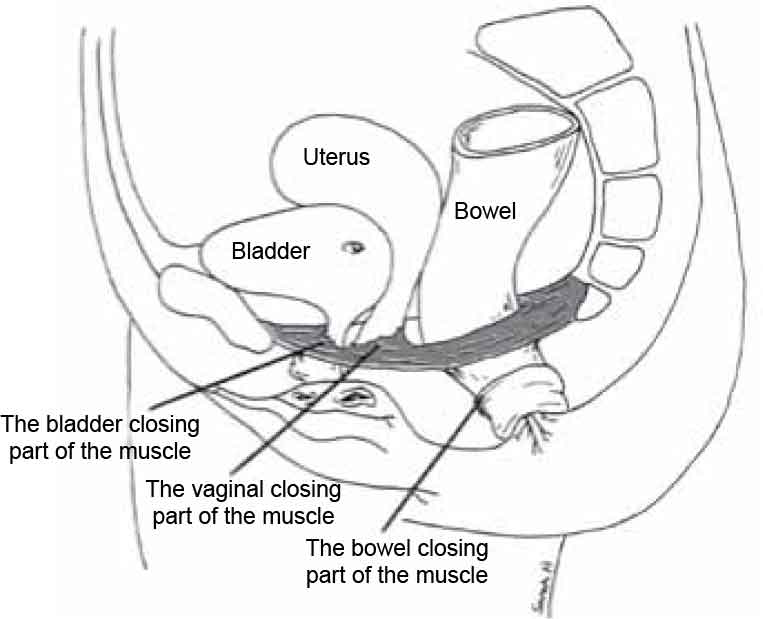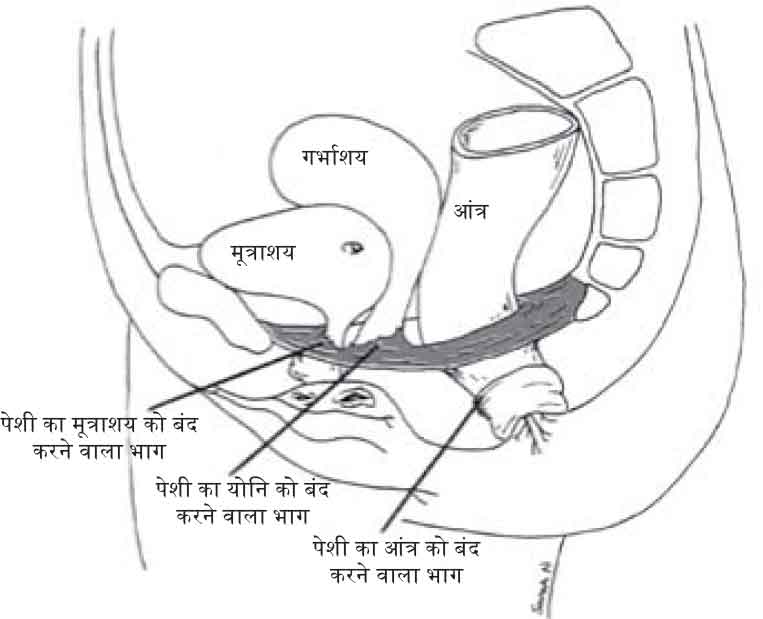|
When you are pregnant, you get a lot of advice from many people. One issue that few people think about are signs of bladder and bowel control problems in pregnancy and after the birth. |
जब आप गर्भवती होती हैं, तो आपको कई लोगों से बहुत सी सलाह मिलती है। एक मुद्दा जिसके बारे में बहुत कम लोग सोचते हैं, वह है - गर्भावस्था में और उसके बाद मूत्राशय और आंत्र नियंत्रण की समस्याएँ। |
What do my pelvic floor muscles do?See the picture of the pelvic floor. The pelvic floor muscles do a number of things. They:
|
मेरे पेल्विक फ्लोर की माँस-पेशियाँ क्या करती हैं?पेल्विक फ्लोर का चित्र देखें। पेल्विक फ्लोर की माँस-पेशियाँ अनेकानेक कार्य करती हैं। वे:
|
|
|
|
How do i know if i have a problem?There are a few things that might happen if you have weak pelvic floor muscles. You might:
You may also have sexual problems. Just after your baby is born, you will be very tired and busy with your baby. Vaginal birth can cause weakness around the vagina or a lack of feeling. Vaginal tears and trauma can cause pain for many months. While breast feeding, oestrogen levels may be low and so the vagina may be dry, which can cause more problems. It may be helpful for you and your partner to talk about these issues with a health professional. |
मुझे यह कैसे पता चलेगा कि मैं समस्या से ग्रस्त हूँ?यदि आपके पेल्विक फ्लोर की माँस-पेशियाँ कमजोर हैं, तो कुछ घटनाएँ घटित हो सकती हैं। हो सकता है कि:
हो सकता है कि आपको यौन समस्याएँ भी हों। अपने शिशु के जन्म के तुरंत बाद आप बहुत थकी हुई होंगी और अपने शिशु के साथ व्यस्त होंगी। योनि से शिशु-जन्म होने के कारण योनि के इर्द-गिर्द कमजोरी पैदा हो सकती है और अनुभूति कम हो सकती है। योनि में चीरे और आघात कई महीनों के लिए दर्द का कारण बन सकते हैं। स्तनपान कराते समय एस्ट्रोजन का स्तर कम हो सकता है और इसलिए योनि शुष्क हो सकती है, जिससे और भी अधिक समस्याएं पैदा हो सकती हैं। आप और आपके सहभोगी के लिए एक स्वास्थ्य पेशेवर के साथ इन मुद्दों के बारे में बात करना सहायक हो सकता है। |
How can i tell if i might get bladder and bowel problems?Some women seem more likely to have bladder and bowel problems, even if they have had quite easy birth. We can’t yet tell who these women might be. Women who already have bladder or bowel symptoms, such as irritable bowel syndrome or an urgent need to pass urine (also called overactive bladder) will be more likely to have this problem worsen or to gain new problems. Constipation, coughing and obesity can also make problems worse. Certain things about the birth can make a woman more likely to have bladder and bowel problems:
|
मैं यह कैसे बता सकती हूँ कि मुझे मूत्राशय और आंत्र की समस्याएँ हो सकती हैं?कुछ महिलाओं के लिए मूत्राशय और आंत्र की समस्याओं की संभावना अधिक होती है, भले ही उनके लिए शिशु-जन्म की प्रक्रिया काफी आसान रही हो। हम अभी तक यह नहीं बता सकते हैं कि ये महिलाएँ कौन होंगी। जो महिलाएँ पहले से ही ऐसे मूत्राशय या आंत्र के लक्षणों से ग्रस्त होती हैं, जैसे इरिटेबल बोवल सिंड्रोम या मूत्र-त्याग करने के लिए एक तत्काल आवश्यकता महसूस करना (जिसे अतिसक्रिय मूत्राशय भी कहा जाता है), उनके लिए यह समस्या और भी अधिक खराब होने की या नई समस्याएँ पैदा होने की संभावना होती है। कब्ज़, खाँसी और मोटापा भी इन समस्याओं को बदतर बना सकते हैं। जन्म के बारे में कुछ बातें किसी महिला के लिए मूत्राशय और आंत्र की समस्याओं के पैदा होने की संभावना और अधिक बढ़ा सकती हैं:
|
What if i have a caesarean birth?Choosing a caesarean birth might seem like a way to avoid these problems, but it is not that simple. A caesarean birth might reduce the risk of severe bladder control problems from 10% to 5% for a first baby, but after the third caesarean there may be no benefit at all. And caesarean births carry their own risks. Babies born this way are more likely to have breathing problems at birth. It can be more risky for the mother and scarring from caesarean births can make pelvic surgery more difficult in the future. So you may be trading one problem for another. In many cases, a vaginal birth runs just as planned and is a lovely event for parents, so this type of birth is best when possible. But problems can still happen. Research is now looking at how we can better know about and stop harm to the pelvic floor during birth. For now, pregnancy and birth involves making a choice between different kinds of risk. You and your partner need to think about these risks and discuss them with your pregnancy care professional. No one can promise you and your baby a perfect outcome. |
यदि मेरा शिशु-जन्म सीजेरियन हो, तो?सीजेरियन शिशु-जन्म का चयन करना इन समस्याओं से बचने के लिए एक तरीका लग सकता है, लेकिन यह इतना आसान नहीं है। सीजेरियन शिशु-जन्म से गंभीर मूत्राशय नियंत्रण समस्याओं का खतरा कम हो सकता है, पहले शिशु के लिए 10% से घटकर 5% तक), लेकिन तीसरे सीजेरियन के बाद हो सकता है कि कोई भी लाभ न हो। और सीजेरियन जन्म के अपने स्वयं के खतरे होते हैं। इस तरह से पैदा हुए शिशुओं के लिए जन्म के समय साँस लेने में समस्या होने की संभावना अधिक होती है। यह माता के लिए अधिक खतरनाक हो सकता है और सीजेरियन शिशु-जन्मों से पड़ने वाले घाव के चिन्ह से भविष्य में पेल्विक सर्जरी और अधिक कठिन हो सकती है। इसलिए आप एक समस्या के निराकरण के लिए दूसरी समस्या को अपना रही होती हैं। कई मामलों में योनि से जन्म योजना के अनुसार होता है और यह माता-पिता के लिए एक सुखप्रद घटना होती है, इसलिए इस प्रकार का जन्म जब सँभव हो तो सबसे अच्छा रहता है। लेकिन फिर भी समस्याएँ हो सकती हैं। अनुसंधान अब इस बात पर ध्यान दे रहा है कि हम जन्म के दौरान पेल्विक फ्लोर को होने वाली क्षति को कैसे बेहतर समझ सकते हैं और रोक सकते हैं। अभी के लिए, गर्भावस्था और जन्म के खतरों में विभिन्न प्रकारों के बीच एक विकल्प का चयन करना शामिल है। आप और आपके सहजीवी को इन खतरों के बारे में सोचने की आवश्यकता है और अपने गर्भावस्था देखभाल पेशेवर के साथ इन पर चर्चा करने की ज़रूरत है। कोई भी आपके और आपके शिशु के लिए एक बिल्कुल सही परिणाम का वादा नहीं कर सकता है। |
What can i do about weak pelvic floor muscles?The birth of a baby might have stretched your pelvic floor muscles. Any ‘pushing down’ action in the first weeks after the baby’s birth might stretch the pelvic floor again. You can help to protect your pelvic floor muscles by not pushing down on your pelvic floor. Here are a few ideas to help you.
For more information, see the leaflet “Good Bladder Habits for Everyone.” |
मैं पेल्विक फ्लोर की कमजोर माँस-पेशियों के बारे में क्या कर सकती हूँ?हो सकता है कि शिशु-जन्म से आपके पेल्विक फ्लोर की माँस-पेशियों में फैलाव हुआ हो। शिशु-जन्म के बाद पहले कुछ सप्ताहों में कोई भी 'नीचे धक्का' देने की क्रिया से पेल्विक फ्लोर पर फिर से खिंचाव पड़ सकता है। आप नीचे धक्का न देकर अपने पेल्विक फ्लोर की माँस-पेशियों की रक्षा करने में मदद कर सकती हैं। आपकी सहायता के लिए यहाँ कुछ विचार दिए गए हैं।
और अधिक जानकारी के लिए पत्रक "हर किसी के लिए अच्छी मूत्राशय आदतें" देखें। |
Will things get better?Do not lose heart. Even very poor bladder or bowel control just after giving birth can get better without help in the first six months, as the pelvic floor tissues, muscles and nerves mend. Regular pelvic floor muscle training kept up over the long term, as well as the right advice, will help. Don’t forget to look after yourself at a time when it is easy to neglect your own needs. If things are not getting better after six months, speak to your doctor, physiotherapist, or continence nurse advisor. |
क्या स्थिति बेहतर हो पाएगी?दिल छोटा न करें। जन्म देने के तुरंत बाद बहुत खराब मूत्राशय या आंत्र नियंत्रण भी बिना मदद के अगले छह महीनों में बेहतर हो सकता है, क्योंकि आपके पेल्विक फ्लोर के ऊतकों, माँस-पेशियों और नसों में सुधार होता है। लंबी अवधि के लिए नियमित रूप से पेल्विक फ्लोर माँस-पेशी प्रशिक्षण करने और साथ ही सही सलाह से मदद मिलेगी। इस समय जबकि अपनी स्वयं की आवश्यकताओं की उपेक्षा करना आसान होता है, अपनी देखभाल करना न भूलें। यदि छह महीने के बाद भी स्थिति बेहतर नहीं हो रही है, तो अपने डॉक्टर, फिजियोथेरेपिस्ट, या कॉन्टिनेंस नर्स सलाहकार के साथ बात करें। |
Seek helpQualified nurses are available if you call the National Continence Helpline on 1800 33 00 66* (Monday to Friday, between 8.00am to 8.00pm Australian Eastern Standard Time) for free:
If you have difficulty speaking or understanding English you can access the Helpline through the free Telephone Interpreter Service on 13 14 50. The phone will be answered in English, so please name the language you speak and wait on the phone. You will be connected to an interpreter who speaks your language. Tell the interpreter you wish to call the National Continence Helpline on 1800 33 00 66. Wait on the phone to be connected and the interpreter will assist you to speak with a continence nurse advisor. All calls are confidential. * Calls from mobile telephones are charged at applicable rates. |
सहायता के लिए पूछेंयदि आप नि:शुल्क 1800 33 00 66* (सोमवार से शुक्रवार 8:00 बजे सुबह से लेकर 8:00 बजे रात के बीच, ऑस्ट्रेलियाई पूर्वी मानक समय) पर National Continence Helpline को कॉल करें, तो प्रशिक्षित नर्सें उपलब्ध हैं:
यदि आपको अंग्रेज़ी बोलने या समझने में कठिनाई होती है, तो आप 13 14 50 पर नि:शुल्क टेलीफोन दुभाषिया सेवा के माध्यम से हेल्पलाइन का उपयोग कर सकते/सकती हैं। फोन का उत्तर अंग्रेज़ी में दिया जाएगा, इसलिए जो भाषा आप बोलते/बोलती हैं, उसका नाम फोन पर बताएँ और प्रतीक्षा करें। आपको अपनी भाषा बोलने वाले दुभाषिए के साथ जोड़ा जाएगा। आप दुभाषिए को बताएँ कि आप National Continence Helpline को 1800 33 00 66 पर कॉल करना चाहते/चाहती हैं। फोन पर जुड़ने के लिए प्रतीक्षा करें और दुभाषिया आपको एक संयम नर्स सलाहकार के साथ बात करने में सहायता करेगा। सभी कॉलें गोपनीय रहती हैं। * मोबाइल फोन से की गई कॉलों का शुल्क लागू दरों पर लगता है। |
Expecting A Baby? in Hindi
क्या आप एक शिशु को जन्म देने वाली हैं?
Browse and download our factsheets in Hindi
Last Updated: Fri 30, Jul 2021
Last Reviewed: Tue 17, Mar 2020



